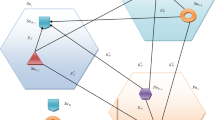Abstract
In this paper, we develop a unifying optimization formulation to describe the Dynamic Channel and Power Assignment (DCPA) problem and an evaluation method for comparing DCPA algorithms. DCPA refers to the allocation of transmit power and frequency channels to links in a cognitive network so as to maximize the total number of feasible links while minimizing the aggregate transmit power. We apply our evaluation method to five representative DPCA algorithms proposed in the literature. This comparison illustrates the tradeoffs between control modes (centralized versus distributed) and channel/power assignment techniques. We estimate the complexity of each algorithm. Through simulations, we evaluate the effectiveness of the algorithms in achieving feasible link allocations in the network, and their power efficiency. Our results indicate that, when few channels are available, the effectiveness of all algorithms is comparable and thus the one with smallest complexity should be selected. The Least Interfering Channel and Iterative Power Assignment algorithm does not require cross-link gain information, has the overall lowest run time, and achieves the highest feasibility ratio of all the distributed algorithms; however, this comes at a cost of higher average power per link.
Similar content being viewed by others
References
Chin, C.M., Sim, M.L., Olafsson, S. (2007). A dynamic channel assignment strategy via power control for ad-hoc network systems. In Vehicular Technology Conference, 2007 VTC2007-Spring IEEE 65th pp. 3006–3010. doi:10.1109/VETECS.2007.616.
ElBatt T., Ephremides A. (2004) Joint scheduling and power control for wireless ad hoc networks. IEEE Transactions on Wireless Communications 3(1): 74–85
Foschini G., Miljanic Z. (1993) A simple distributed autonomous power control algorithm and itsconvergence. IEEE Transactions on Vehicular Technology 42(4): 641–646
Grace D., Tozer T., Burr A. (2000) Reducing call dropping in distributed dynamic channel assignment algorithms by incorporating power control in wireless ad hoc networks. IEEE Journal on Selected Areas in Communication 18(11): 2417–2428
Kulkarni, G., & Srivastava, M. (2002). A channel assignment scheme for FDMA based wireless ad hoc networks in Rayleigh fading environments. In 2002 IEEE 56th Vehicular Technology Conf. (VTC 2002-Fall), vol 2.
Skiena S. (1998) The algorithm design manual. Springer, Berlin
Thomas R., Friend D., DaSilva L., MacKenzie A. (2006) Cognitive networks: Adaptation and learning to achieve end-to-end performance objectives. IEEE Communications Magazine 44(12): 51–57
Zander J. (1992) Performance of optimum transmitter power control in cellular radiosystems. IEEE Transactions on Vehicular Technology 41(1): 57–62
Author information
Authors and Affiliations
Corresponding author
Additional information
This work is partially supported by the Idaho National Laboratory (INL) Ph.D. Candidate Program and Virginia Tech Bradley Fellowship. Work supported by the INL is done under Battelle Energy Alliance, LLC under Contract No. DE-AC07-05ID14517 with the U.S. Department of Energy. The United States Government retains and the publisher, by accepting the article for publication, acknowledges that the United States Government retains a nonexclusive, paid-up, irrevocable, world-wide license to publish or reproduce the published form of this manuscript, or allow others to do so, for United States Government purposes. The views and conclusions contained in this document are those of the authors and should not be interpreted as representing the official policies, either expressed or implied, of the Department of Energy or the U.S. Government.
An erratum to this article can be found at http://dx.doi.org/10.1007/s11277-012-0630-6
Rights and permissions
About this article
Cite this article
Deaton, J.D., Ahmad, S.A., Shukla, U. et al. Evaluation of Dynamic Channel and Power Assignment for Cognitive Networks. Wireless Pers Commun 57, 5–18 (2011). https://doi.org/10.1007/s11277-010-0003-y
Published:
Issue Date:
DOI: https://doi.org/10.1007/s11277-010-0003-y




